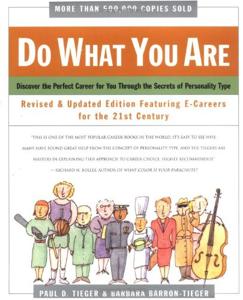
Want to learn the ideas in Do What You Are better than ever? Read the world’s #1 book summary of Do What You Are by Paul D. Tieger, Barbara Barron-Tieger here.
Read a brief 1-Page Summary or watch video summaries curated by our expert team. Note: this book guide is not affiliated with or endorsed by the publisher or author, and we always encourage you to purchase and read the full book.
Video Summaries of Do What You Are
We’ve scoured the Internet for the very best videos on Do What You Are, from high-quality videos summaries to interviews or commentary by Paul D. Tieger, Barbara Barron-Tieger.
1-Page Summary of Do What You Are
Overview
If you’ve ever been in a job where your coworker seems to be doing the same work with ease and a smile, then you’ll realize that personality affects how well we do our jobs. In fact, even identical twins have different personalities. Likewise, what one person finds enjoyable is not necessarily rewarding for another person.
It’s much easier to know what you don’t like doing than what you do like doing. Fortunately, knowledge of your personality type can help steer you toward work that will be enjoyable and away from work that will be unpleasant.
Research has shown that people have different personality traits and preferences. We can use this information to understand ourselves better, as well as others. The author will explain how we can do that using the Myers-Briggs Type Indicator (MBTI).
In this article, you’ll learn what makes a great job and how to find one. You’ll also learn about the differences between traditionalists and idealists, as well as the benefits of having an encore career.
Big Idea #1: The notion of personality types is enduring, and it could be the reason you’re unsatisfied at work.
If you’re tired of going to work every day, there’s a good chance that your job is not the right fit for your personality.
The idea of different personality types isn’t new. It goes back to ancient Greece and was refined in 1921 by a renowned psychoanalyst named Carl Jung.
A few years later, an American woman named Katherine Briggs developed the concept even further. She came up with a personality test that was based on four scales and 16 different types of personalities.
The history of personality types is an interesting one. Personality type preferences can help you identify your most satisfying career path, which may not be what you think it is. People are all different and their personalities have specific preferences for interacting with the world around them. Therefore, working in a job that doesn’t suit your personality makes you uncomfortable and you won’t succeed as well as if it did suit your personality type.
The truth is, work doesn’t have to be a painful or unpleasant experience. It can actually help you grow and become better at what you do if it suits your personality. If you’re in the right job for yourself, then you’ll enjoy doing it and feel energized by it.
Let’s look at two people, Arthur and Julie. They were both working as placement counselors at a job recruitment firm, but they had very different personalities. Arthur was talkative and high-energy while Julie was slow-paced and disliked conflict.
Arthur, who was good at talking to different people and didn’t take rejection personally, did well in his job. Julie, on the other hand, wasn’t as good at that kind of thing. People’s personalities are important to their professional success and happiness.
Big Idea #2: To find your personality type, start by determining how you interact with the world and take in information.
In order to find out which personality type you are, you must first take four preference scales. The first scale asks whether you prefer to interact with the world or keep to yourself. Extraversion involves looking at the world and asking how it affects you, while Introversion is about how your actions affect it.
People who lean toward Extraversion tend to think through talking. For example, extraverts in college classrooms will raise their hand before they have a complete answer and then talk themselves into the right answer. Introverts, on the other hand, will mull over an answer until it is complete in their minds and they can come up with a firm conclusion.






